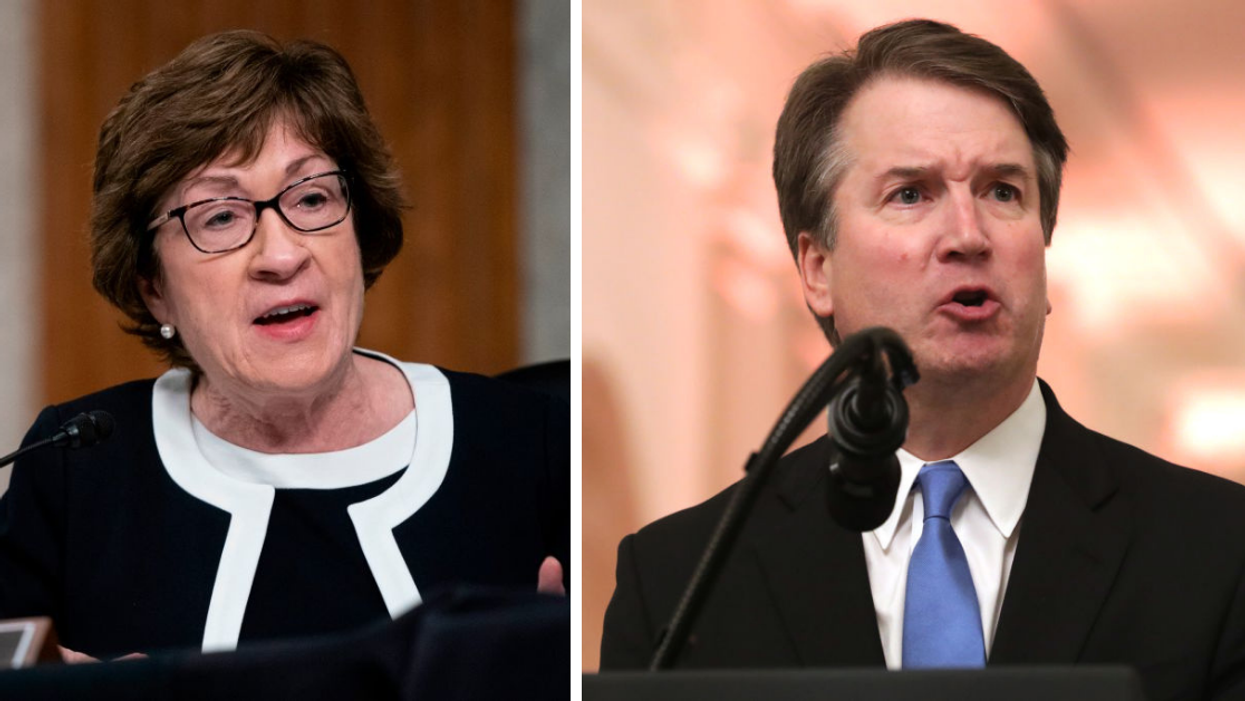In 2018, Maine Republican Senator Susan Collins voted to confirm Associate Justice Brett Kavanaugh to the Supreme Court of the United States.
Collins's decisive vote came despite criticisms about Kavanaugh's history of hardline conservative jurisprudence and concerns over what that could mean for abortion rights.
She insisted that Kavanaugh would not vote to undermine or overturn Roe v. Wade, the landmark Supreme Court decision that protects a pregnant woman's right to choose reproductive healthcare without excessive government restriction.
But ultimately, Collins would turn out to be wrong about Kavanaugh.
Very wrong, in fact, as you can see in a damning supercut that's now gone viral.
As these clips demonstrate, Collins justified her support for Kavanaugh multiple times, including when she issued some of the following defenses:
"I do not believe Brett Kavanaugh will overturn... he noted that Roe had been reaffirmed 19 years later by [the 1992 Supreme Court ruling] Planned Parenthood v. Casey and that it was precedent on precedent..."
"We talked about whether he considered Roe to be settled law."
"He said that he agreed with what Justice [John] Roberts said at his nomination hearing in which he said it was settled law..."
"I could not vote for a judge who had demonstrated hostility to Roe v. Wade because it would indicate a lack of respect for precedent."
"What Judge Kavanaugh told me–and he's the first Supreme Court nominee that I've interviewed out of six–is that he views precedent not just as a legal doctrine, but as rooted in our Constitution and he reveres our Constitution..."
"I asked him, 'Is it sufficient that five current sitting Justices believe that Roe should be overturned?' and he said, 'No.'"
Kavanaugh was one of five Justices who voted not to block a Texas law that went into effect Wednesday that prohibits virtually all abortions after a heartbeat is detected, which is typically after six weeks of pregnancy.
The law, referred to as a "fetal heartbeat bill," would also allow citizens to file lawsuits against abortion providers suspected of violating the new policy.
The Supreme Court voted 5-4 to deny an emergency appeal from abortion providers to block it, saying they had not met the burden required for a stay of the law.
It noted, however, that the order would likely not be the final word on the law and that it is open to hearing other challenges.
Meanwhile, Collins has responded to renewed criticism about her vote to confirm Kavanaugh, calling the law "extreme and harmful."
But this isn't the first time that her vote to confirm him has come under fire from abortion rights groups.
Last year, Collins faced heavy criticism after Kavanaugh said states should be permitted to severely reduce access to and availability of abortion in his dissent in June Medical Services, LLC v. Russo.
Now she's in the hot seat again.
People are expressing their anger and frustration with a lawmaker who they believe cemented the current blow to reproductive rights.
Collins's vote to confirm Kavanaugh has haunted her even before Kavanaugh took his seat on the court.
Kavaugh was confirmed in 2018 amid controversy over the time-limited investigation into the sexual misconduct allegations against him.
His fate was in the hands of several undecided senators, including Collins, who in a much-maligned speech on the Senate floor, claimed that she believed Dr. Christine Blasey Ford, the Stanford University professor who in her testimony before the Senate Judiciary Committee, recalled when Kavanaugh assaulted her at a party when they were both in high school.
However, Collins clarified that she believed Dr. Ford was assaulted, just not by Kavanaugh, despite Dr. Ford's testimony that she could absolutely identify Kavanaugh as the perpetrator.
The blowback against Collins prompted then-Maine House Speaker Sara Gideon to announce a campaign to unseat Collins, who was considered one of the more vulnerable Republicans in the Senate.
Gideon ultimately underperformed and Collins won reelection.















 @DuncanCecil/X
@DuncanCecil/X @@realDonaldTrump/Truth Social
@@realDonaldTrump/Truth Social @89toothdoc/X
@89toothdoc/X @xray_media/X
@xray_media/X @CHRISTI12512382/X
@CHRISTI12512382/X
 @sza/Instagram
@sza/Instagram @laylanelli/Instagram
@laylanelli/Instagram @itssharisma/Instagram
@itssharisma/Instagram @k8ydid99/Instagram
@k8ydid99/Instagram @8thhousepath/Instagram
@8thhousepath/Instagram @solflwers/Instagram
@solflwers/Instagram @msrosemarienyc/Instagram
@msrosemarienyc/Instagram @afropuff1/Instagram
@afropuff1/Instagram @jamelahjaye/Instagram
@jamelahjaye/Instagram @razmatazmazzz/Instagram
@razmatazmazzz/Instagram @sinead_catherine_/Instagram
@sinead_catherine_/Instagram @popscxii/Instagram
@popscxii/Instagram